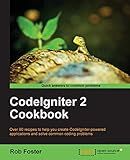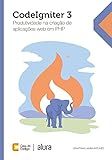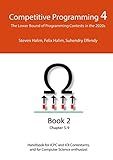Best Guides on CodeIgniter Functions to Buy in February 2026

CodeIgniter: Learn By Coding



CodeIgniter 2 Cookbook



CodeIgniter: Produtividade na criação de aplicações web em PHP (Portuguese Edition)



Desenvolvimento Web com CodeIgniter 4.0: Um Guia Prático e Completo para Iniciantes e Profissionais (Portuguese Edition)



Desvendando o CodeIgniter 4 (Portuguese Edition)



Competitive Programming 4 - Book 2: The Lower Bound of Programming Contests in the 2020s



Docker para CodeIgniter 4 e PHP: Práticas Seguras, Documentação Automática e Casos de Uso (Portuguese Edition)



Guida a Codeigniter : Guida pratica (Italian Edition)



Code Works Why Meme Programming Coding Funny Professional T-Shirt
- PERFECT GIFT FOR GEEKY FRIENDS: PROGRAMMERS, CODERS, AND STUDENTS!
- LIGHTWEIGHT, CLASSIC FIT FOR COMFORT IN ANY CODING ENVIRONMENT.
- UNIQUE DESIGN CELEBRATES MEME PROGRAMMING, APPEALING TO ALL DEVELOPERS!



Colorful Lines of Programming Codes for Programmers T-Shirt
- EYE-CATCHING DARK MODE DESIGN APPEALS TO TECH ENTHUSIASTS.
- PERFECT GIFT FOR BOTH YOUNG AND SEASONED PROGRAMMERS ALIKE.
- COMFORTABLE FIT ENSURES ALL-DAY WEAR FOR CODING SESSIONS.


In CodeIgniter, you can use the concat function with an update statement by using the query builder class.
You can concatenate values from different columns or strings using the concat function in the set method of the update statement.
Here is an example code snippet:
$this->db->set('column_name', "CONCAT(column_name, 'string_to_concatenate')", FALSE); $this->db->where('id', $id); $this->db->update('table_name');
In this code, 'column_name' is the column in the table that you want to concatenate with a string. 'string_to_concatenate' is the string that you want to append to the existing value in the column.
The FALSE parameter in the set method is used to prevent CodeIgniter from escaping the SQL statement, allowing you to use the concat function directly in the query.
Make sure to replace 'column_name', 'string_to_concatenate', 'id', and 'table_name' with the appropriate values in your database.
What is the importance of using proper data types with the concat function in codeigniter?
Using proper data types with the concat function in CodeIgniter is important because it ensures that the function operates correctly and efficiently. When concatenating strings in CodeIgniter, if the data types are not appropriate, it can lead to unexpected results or errors in the output.
For example, if you concatenate a string with an integer without typecasting it properly, you may end up with unexpected characters or invalid results. By using the correct data types, you can avoid these issues and ensure that the concat function works as intended.
Additionally, using proper data types with the concat function can also help improve the performance of your code. When working with large data sets, using the correct data types can help optimize the concatenation process and reduce processing time.
Overall, using proper data types with the concat function in CodeIgniter helps ensure the accuracy and efficiency of your code, ultimately leading to a better user experience and smoother functioning of your application.
How do you use the concat function with update in codeigniter?
In CodeIgniter, the concat() function is used to concatenate strings in SQL queries. When combining it with the update() function, you can concatenate strings and update a specific column in a database table.
Here's an example of how you can use concat() with the update() function in CodeIgniter:
$data = array( 'column_name' => 'CONCAT(column_name, "new_value")', );
$this->db->where('id', $id); $this->db->update('table_name', $data);
In this example, column_name is the name of the column you want to update, and new_value is the string you want to concatenate with the existing value in that column.
Make sure to replace 'id', 'table_name', and the column and values with your actual database table column and values.
How to handle errors when using the concat function in codeigniter?
To handle errors when using the concat function in CodeIgniter, you can use PHP's traditional error handling mechanisms like try/catch blocks or conditionals with if/else statements. Here is an example:
try { $result = $this->db->select('CONCAT(first_name, " ", last_name) as full_name', false) ->from('users') ->get() ->result();
if ($result) {
// Process the results
} else {
throw new Exception('Error fetching data from the database');
}
} catch (Exception $e) { // Handle the error echo 'An error occurred: ' . $e->getMessage(); }
In this example, we are using a try/catch block to catch any exceptions that may occur when fetching data from the database using the concat function. If an error occurs, an exception is thrown with an error message which is then caught in the catch block and displayed to the user.
You can also use CodeIgniter's built-in error handling features like logging errors or displaying error messages using the show_error function.
What are the benefits of using the concat function in codeigniter?
- Easily combine arrays: The concat function in CodeIgniter allows you to easily merge arrays together without having to write complex code.
- Maintain clean and readable code: By using the concat function, you can keep your code clean and organized, making it easier for other developers to understand and maintain.
- Improved code efficiency: Concatenating arrays using the concat function can improve the efficiency of your code by reducing the number of lines of code needed to achieve the desired result.
- Flexibility: The concat function gives you the flexibility to merge arrays in different ways, such as joining them at the beginning or end, or adding elements in between.
- Increased productivity: By using the concat function, you can save time and effort on writing repetitive code for array merging, allowing you to focus on other aspects of your project.
What is the maximum number of arguments supported by the concat function in codeigniter?
The concat function in CodeIgniter can accept an unlimited number of arguments. There is no specific maximum number of arguments supported by the concat function.
How do you concatenate columns in codeigniter?
In CodeIgniter, you can concatenate columns by using the select() method and passing the concatenated columns as an argument.
Here's an example of how you can concatenate columns in CodeIgniter:
$this->db->select("CONCAT(column1, ' ', column2) as concatenated_column", false); $this->db->from("table_name"); $query = $this->db->get();
$result = $query->result_array();
In this example, we are concatenating two columns column1 and column2 with a space in between and aliasing the concatenated result as concatenated_column. The false argument in the select method tells CodeIgniter not to escape the query.
After executing the query, you can retrieve the concatenated result from the returned result array.
